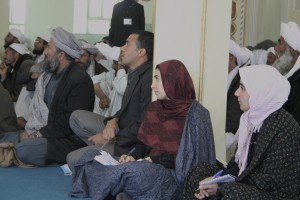During the Taliban regime, I was confined to my house for years. I was deprived of my education, of studying and teaching. I was not allowed to run, to speak loudly, to laugh hard. I was ‘bad’ if I talked to male classmates or colleagues. But now the chains are broken, the prison is ruined, and the women are out.
After 9/11 and the US presence in Afghanistan, the lives of Afghan women has become an important topic in the media. It is a joy to see that we, Afghan women, can now be educated, study, teach, and participate actively in the politics, business, and social reconstruction and rehabilitation of Afghanistan. But there is still a real worry. Every 30 minutes, an Afghan woman dies during childbirth; 87 percent of Afghan women are illiterate; only 30 percent of girls have access to education in Afghanistan; 1 in every 3 Afghan women experience physical, psychological, or sexual violence; the average life expectancy rate for women in Afghanistan is 44 years; and 70 to 80 percent of Afghan women face forced marriages.
As an Afghan girl, I am pleased with what I have accomplished so far and what my mother’s generation has done for my homeland. I am happy, yet insecure. I am proud, yet discouraged.
The questions before us are: will Afghan women’s rights be secured in the reconciliation talks between the Afghan government and Taliban insurgents? Will it be guaranteed that women’s schools will not be closed again? That our jobs will not be taken from us? That our daughters will be able to attend schools? That our movements will not be restricted? That we will be given our human rights as any other Afghan citizen? Where are the rewards for my mother’s hard work, and where will be my daughter’s right to education, marriage, and a free and independent life, if not guaranteed in the reconciliation talks with the Taliban?
We have suffered from war and we have been victims, and we must be included in the peace talks too. We, Afghan women, must have a say in what peace looks like in Afghanistan.




Greetings Rona djan! Your article touched me deeply. I am of Khazar origin and a storyteller with special interest in stories that evolve out of Conflict situations. I have a project in mind: to collect stories such as you have told and to publish them. But also, to create from them a live STORYTELLING field that I could use to illustrate the pain and the longing these events show, and to find a way of bringing healing through clarity and better understanding. I’d be interested in your ideas on this. Emeliye
It was a nice peice and real true about lives of Afghan women in Afghanistan. Rona jan thank you for letting the word hear about the truth and situations that is hurting everyone.